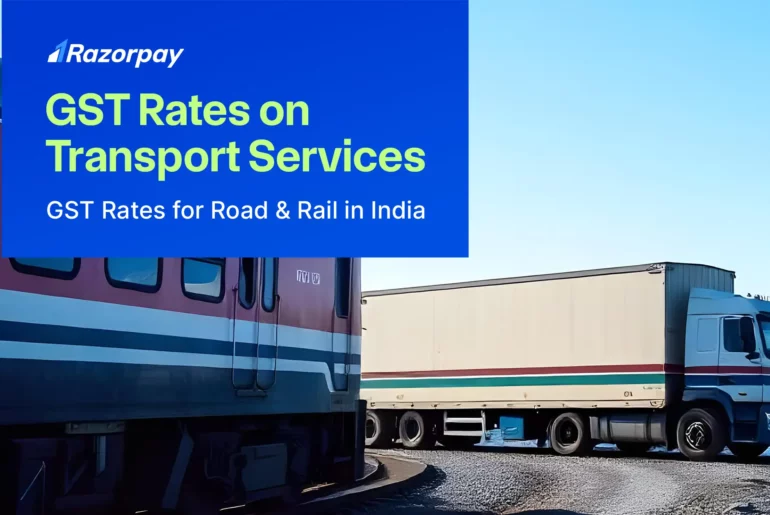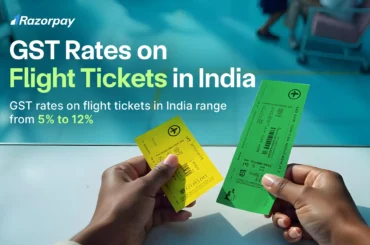Transportation is key to India’s economy, linking markets and boosting trade. GST on transport services has reshaped the tax structure, affecting costs and operations. GST rates differ by service type and are categorized under HSN codes, simplifying compliance for businesses. Let’s explore how these changes impact the transport sector.
Table of Contents
GST on Transport: Road Services in 2025
GST rates on road transport vary depending on the specific mode of transportation chosen.
Here’s the list of road transport services and their GST Rates:
Types of Road Transport Services |
GST Rate |
| Public Transport for passengers | NIL |
| Transport through metered auto rickshaw, e-rickshaw, or taxi | NIL |
| Transport through Non-AC Contract Carriage or Stagecoach | NIL |
| Transport through AC Contract Carriage or Stagecoach (without Input Tax Credit) | 5% |
| Transport through radio taxi and similar other services | 5% |
| Transport through rental services for cars, buses, coaches, | 18% |
GST on Road Transport Services for Goods (GTA, non-GTA)
A Goods Transport Agency (GTA) refers to any entity providing services related to the transport of goods by road and issuing a consignment note.
The GST on transportation charges of goods by a GTA (Goods Transport Agency) are:
- 5% GST if Input Tax Credit (ITC) is not availed.
- 12% GST if ITC is availed.
GST rates for GTAs vary based on the type of goods transported and the value of the consignment.
GST Rates for GTA Services:
- 0% GST on Transport services: Applicable for goods such as agricultural produce, milk, salt, food grains, organic manure, newspapers, relief materials, and defense equipment.
- 0% GST on Transport services: If the transportation charge for a single carriage is less than ₹1,500 or if the total charge for a single consignee is under ₹750.
- 5% GST (without ITC) or 12% GST (with ITC) on Transport services: Applies to other goods not covered by exemptions. The transporter can choose the rate based on whether they wish to claim an input tax credit (ITC).
Special Cases:
- 0% GST on Transport: When transporting used household goods for personal use or hiring vehicles to a GTA.
- Transport of goods by unregistered persons or casual taxable persons: Initially exempt, these transactions are now taxable, but the final list is yet to be notified.
Forward vs. Reverse Charge:
- GTAs can opt for the forward charge mechanism, where they collect and pay GST (5% without ITC or 12% with ITC) after submitting an annual declaration.
- Under the reverse charge mechanism (RCM), the service recipient is responsible for paying GST, particularly when the GTA opts for 5% without ITC.
GST on Transport Charges: Non-GTA Road Transport
For road transport services provided by entities that do not qualify as GTAs (i.e., they do not issue a consignment note), the transportation of goods is exempt from GST. This provides relief to businesses using non-GTA services as they don’t have to bear any tax burden for such services.
GST on Passenger Transport Services (Public Transport, Taxis, Cabs)
Passenger transportation services in India include public transport, taxis, and cabs, each subject to distinct GST rates depending on the type of service provided.
GST on Public Passenger Transport Servies
Public transport systems, such as buses, metro, and trains, are typically exempt from GST, ensuring that essential and affordable transport options remain accessible to the public passengers.
GST on Passenger Taxis and Cabs
For privately operated passenger services such as taxis, cabs, and radio taxis, a 5% GST on transport is generally applicable. However, operators have the option to pay GST at a 12% rate if they wish to claim the benefit of a full input tax credit (ITC), allowing them to offset tax liabilities against other business expenses.
This differentiation in GST rates ensures a balance between affordability in public transport and flexibility for private service providers.
Related Read: GST on Cars in India: GST Rates for New, Used & Electric Cars
GST on Transport: Rail Services in 2025
In 2025, GST applies to rail transport services based on the class of travel. For passenger tickets booked in First Class or air-conditioned classes (1st AC, 2nd AC, 3rd AC, AC Chair Car), a 5% GST is charged. However, tickets booked in other classes, such as Sleeper, Second Class, or General, are exempt from GST.
This differentiation ensures that basic travel options remain accessible, while premium travel services are subject to tax.
GST on Rail Transportation Services for Freight
GST on rail freight varies depending on the type of goods being transported. Essential goods, such as agricultural produce, milk, and salt, are exempt from GST. In contrast, general cargo and industrial products are subject to a 5% GST on Transport.
Here’s how it works for different categories of suppliers:
- Registered Taxable Persons: Businesses that are registered for GST and transport goods via rail must pay a 5% GST rate. They can claim an input tax credit (ITC) on this tax, which is validated through invoice matching.
- B2C Supplies (Unregistered Persons): For businesses transporting goods to customers or unregistered entities, the same 5% GST rate applies. However, this tax is not eligible for ITC and is directly deposited into the government treasury.
Read About: Latest Railway Sector Updates in 53rd GST Council Meeting
GST on Transport: Air Services in 2025
GST on air transport services is categorized based on the type of air travel service, with varying rates applied to different ticket classes:
GST on Economy Class Air Tickets
Economy class air tickets are subject to a 5% GST on Transport, designed to make essential travel more affordable.
GST on Business Class Air Tickets
Business class air tickets incur a higher GST rate of 12%, reflecting the premium nature of the service provided.
GST on Chartered Flights for Pilgrimage
Chartered flights for pilgrimage purposes are also subject to a 5% GST rate, promoting accessibility for religious travel.
GST on Rental Services of Aircraft (with or without operator) / Chartered Flights
Rental services of aircraft, whether with or without an operator, attract an 18% GST rate, ensuring a consistent tax framework for these services.
GST on Air Transportation Services for Cargos
For air cargo transportation, a uniform GST rate of 18% is applied. This standardization ensures consistent taxation across air freight services, facilitating smoother operations in the logistics sector.
For passengers traveling for business, the GST on air tickets can be claimed as an input tax credit (ITC). Airlines can also claim ITC on input services for economy class passengers, while for business class, they can claim ITC on food items, spare parts, and other inputs, excluding fuel costs. This structure allows for tax efficiency while supporting affordable travel options.
Related Read: GST on Flight Tickets: Latest Rates & Impact
GST on Transport: Water Service in 2025
GST on Water Transport Services for Passengers
Water transport services for both goods and passengers generally incur a GST rate of 5%. However, this rate does not allow for input tax credit (ITC), meaning businesses cannot claim back the tax paid on these services. This standard rate aims to simplify tax compliance while maintaining cost-efficiency for users of water transport.
GST on Water Transport Services for Cargos
GST on transport charges including rental services for water vessels, including freight vessels (with or without an operator), is 18%. This GST rate applies to the leasing or hiring of vessels used for various purposes, including transportation and logistics.
GST on Other Transport Services in 2025
GST on other transport services, such as inland waterways, is set at 5%. This rate applies without the benefit of input tax credit (ITC), meaning businesses cannot claim ITC on these services.
Understanding GST rates across different transport modes is crucial for businesses in the transportation industry to ensure accurate compliance and cost management.
Goods Transport Agency (GTA) in GST
The Goods Transport Agency (GTA) refers to a service provider that transports goods using hired vehicles.
GTAs are responsible for managing logistics and must issue consignment notes as proof of goods transfer for GST compliance.
What Services Does a GTA Provide?
GTAs offer a range of services beyond transportation, including:
- Loading and Unloading
- Packing and Unpacking
- Trans-shipment
- Temporary Warehousing
These services, when bundled with transportation, fall under the GTA framework. GTAs must adhere to GST regulations, including charging applicable GST rates and providing detailed invoices.
Understanding GST Liability in Goods Transport Agency (GTA) Scenarios
Determining GST liability in GTA transactions varies based on the parties involved. The following table summarizes different scenarios to clarify who is responsible for paying GST when hiring a GTA.
| Service Provider | Supplier/Consignor | Receiver of Goods/Consignee | Person Paying Freight | Person Liable to Pay GST |
| GTA | Registered Manufacturer | Registered Dealer | Registered Manufacturer | Registered Manufacturer |
| GTA | Partnership Firm (Registered) | Unregistered Dealer | Partnership Firm | Partnership Firm |
| GTA | Co-operative Society | Registered Dealer | Co-operative Society | Co-operative Society |
| GTA | URD A (Unregistered Dealer) | Registered Dealer | URD A | Tax must be paid under RCM |
| GTA | Company XYZ (Registered) | URD B (Unregistered Dealer) | Company XYZ | Tax must be paid under RCM |
| GTA | Private Individual | Registered Dealer | Private Individual | Exempt as per previous notifications |
List of Goods and Services Exempted Under GST Rates on Transport
GST on transport charges are exempt for certain goods and services related to transport, providing relief for essential items and services. The following categories are exempt:
- Relief materials for victims of natural or man-made disasters.
- Military and defense equipment.
- Essential food items such as pulses, milk, salt, flour, rice, and other grains.
- Agricultural produce and organic manure.
- Newspapers and magazines registered with the Registrar of Newspapers.
- Transport services where the total charge is less than ₹1,500.
- Household goods transportation.
- Transport of goods for unregistered persons or non-GTA services.
These exemptions ensure that critical goods remain affordable and accessible.
Read More About: List of Goods and Services Exempt Under GST
HSN Code for Transport Charges in 2025
The HSN code for transport charges is 9967. Mentioning this code on invoices is essential for proper classification and taxation, ensuring clarity and accuracy in financial transactions.
Advantages of GST on Transportation Services
1. Single Taxation
GST on transport simplifies the tax structure by consolidating multiple indirect taxes into a single tax, making it easier for businesses to manage and comply with. This reduces the complexity of the tax system and enhances transparency.
2. Input Tax Credit (ITC)
GST on transport allows businesses to claim input tax credits on the taxes paid for inputs, which helps in reducing the overall tax burden. This benefit improves cash flow and encourages investment in the transportation sector.
3. Increased Compliance
With GST’s standardized rules and electronic filing system, compliance becomes more straightforward and efficient. Businesses benefit from a more organized tax administration and reduced chances of discrepancies.
4. Reduced Costs
By eliminating the cascading effect of taxes, GST helps in lowering the overall cost of transportation services. This reduction in tax costs can be passed on to consumers, making services more affordable.
Frequently Asked Questions (FAQs)
1. What is the GST on transportation charges by a GTA?
The GST on transportation of Goods under GTA (goods transport agency) is:
- 5% GST if Input Tax Credit (ITC) is not availed.
- 12% GST if ITC is availed.
2. Is GST applicable on the transportation of household goods?
Yes, GST is applicable on the transportation of household goods, with rates depending on the service provider’s classification (GTA or otherwise).
3. How to file a transporter GST return?
Transporters must file GST returns using the GST portal, providing details of their services and applicable GST rates.
4. How to add transport charges to a GST invoice?
Transport charges should be mentioned in the invoice with the applicable rate of GST on transport, ensuring proper classification and compliance.
5. What is the transporter ID in GST?
The transporter ID is a unique identification number assigned to transporters for GST purposes, used for tracking and compliance.
6. Is GST registration mandatory for transporters?
Yes, GST registration is mandatory for transporters who exceed the prescribed turnover threshold or provide taxable services.
7. What are the rules for GST on transport?
GST rules for transport include adherence to applicable GST rates, issuing consignment notes, and maintaining accurate records for compliance.
8. Do different types of transport services have different GST rates?
Yes, different types of transport services, such as air, rail, and water, have varying GST rates based on the nature of the service and its classification.
9. Who Pays GST When Hiring a GTA?
The recipient of the services pays GST under the reverse charge mechanism when hiring a GTA.
10. Which Businesses Are Liable to Pay GST Under Reverse Charge for a GTA?
The following recipients of services are required to pay GST under the reverse charge mechanism when hiring a GTA:
- Factories registered under the Factories Act, 1948
- Societies registered under the Societies Registration Act, 1860 or any other law
- Co-operative societies established under any law
- GST-registered persons
- Bodies corporate established by or under any law
- Partnership firms (registered or unregistered), including Associations of Persons (AOP)
- Casual taxable persons



